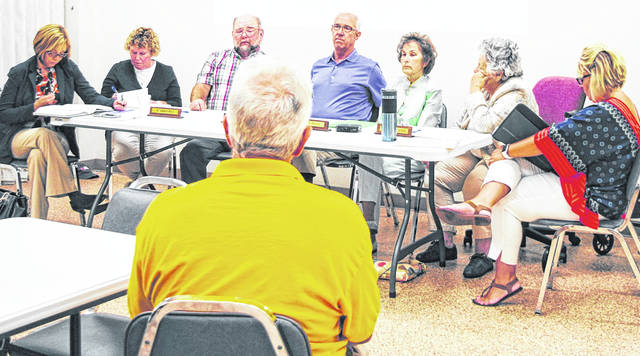
Ohio Secretary of State Frank LaRose has ruled that Antony Weissmann, whose residency was challenged in an Aug. 22 hearing, will be a write-in candidate for Hillsboro mayor in the November general election.
In a letter to the Highland County Board of Elections, LaRose wrote, “On August 12, before the Board certified Mr. Weissmann, Rosemary Ryan filed a protest that claimed Mr. Weissmann had not resided in Hillsboro for a year and is therefore statutorily unqualified to be its mayor. The Board understood that the protestor was mistaken regarding the residency requirements for mayor of Hillsboro. However, the Board proceeded to hold a hearing because a protest was filed.”
LaRose went on to say, “At the outset, it is unclear what specifically the Board was working towards at the hearing — there was no articulation of a new or amended ground for the protest. Ms. Ryan did not explain why she protested this uncertified candidate. A challenge of Mr. Weissmann’s right to vote… would have been appropriate under the circumstances, but the record does not suggest that occurred. To discern Ms. Ryan’s cause for the protest, I merely have the copy of the written protest, which is mistaken on the law, and the proposed minutes entitled ‘Hearing For Protest Challenge of Write-In Candidate for Hillsboro City Mayor.’ To avoid ambiguity in judicial and quasi-judicial hearings, the person making an accusation generally states their case first and explains the grounds for the accusation, not the defense.”
LaRose also identified several other issues that made reviewing the hearing difficult. LaRose wrote, “There is no transcript, recording, or approved minutes to review; only proposed minutes from the hearing. At the hearing, the Board did not formally accept exhibits presented, take possession of them, or make copies of the exhibits Mr. Weissmann presented in his defense.”
LaRose inserted a footnote, which reads: “After the hearing, the Board asked Mr. Weissmann to return with the documents he presented, allowing them to make copies. He obliged and the Board made copies, but they now question whether the returned documents are truly the ones furnished during the hearing. The Board’s cover letter states, ‘After Mr. Weissmann had brought the receipts in that we had requested and left, we then realized that some of the documents he presented us with were not the ones he had shown us during the hearing.’”
As for the other issues that made reviewing the hearing difficult, LaRose wrote, “Only the candidate and protester were sworn in, but the minutes show that others, Rory Ryan and David Osborne, Jr., also questioned the candidate at the hearing. The minutes do not explain Messrs. Ryan and Osborne’s connection to the hearing, why they were not sworn in, why they could question the candidate, or what process the Board used to determine who would examine the candidate. In judicial and quasi-judicial hearings, a third party is typically only a witness; questioning a defendant or candidate is beyond the proper role of a witness.
“The legal burden was incorrectly placed upon the candidate, rather than the protestor… Here the record reflects that neither the protestor, prosecutor, nor anyone else at the hearing produced any evidence against Mr. Weissmann’s residency — not even a simple assertion that he resided somewhere other than where he claimed.
“Finally, the Board voted on the following question: ‘[W]hether Mr. Weissmann’s name as a write-in candidate would appear on the ballot based on his residency.’ This reflects fundamental confusion about the nature of write-in candidacy. No write-in candidate’s name appears on the ballot; a voter writes the candidate’s name in the process of voting for them. But this is the question the Board voted upon and that is the issue before me.”
LaRose stated that when it comes to breaking a tie vote following a hearing, the Secretary of State must base his or her decision on the evidence and records that were submitted; the Secretary of State doesn’t gather further evidence. LaRose concluded, “Therefore, based on the lack of evidence presented to me, inappropriate processes, incorrectly applied burden, and a faulty question, I cannot vote to sustain this protest. The protestor did not meet her burden.”
Highland County Prosecutor Anneka Collins, speaking on behalf of the board of elections, told The Times-Gazette, “We respect the Secretary of State’s decision. We are disappointed that he would allege that we didn’t handle things correctly because there was a representative of the Secretary of State at all parts of the hearing, and we repeatedly asked her for help. She advised us that she was specifically instructed not to help us.”
Reach McKenzie Caldwell at 937-402-2570.


